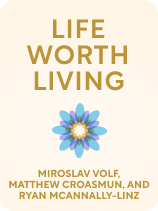

This article is an excerpt from the Shortform book guide to "Life Worth Living" by Miroslav Volf, Matthew Croasmun, and Ryan McAnnally-Linz. Shortform has the world's best summaries and analyses of books you should be reading.
Like this article? Sign up for a free trial here.
What’s your philosophy of happiness? Is it a goal or simply a byproduct of certain aspects of your life?
In Life Worth Living, Miroslav Volf, Matthew Croasmun, and Ryan McAnnally-Linz discuss happiness in the context of your philosophy of life. They explain various perspectives on the role that happiness plays in life.
Continue reading to understand these various philosophies and see where your values line up.
The Philosophy of Happiness
A good life philosophy promotes emotional welfare. Volf, Croasmun, and McAnnally-Linz explain that, for most people, long-term happiness is an integral part of what it means to live well. If that’s true for you, it makes sense to adopt a life philosophy that factors sustainable happiness into the equation, like utilitarianism. The utilitarian philosophy of happiness argues that pleasure and things that increase pleasure are worthwhile, while pain and things that increase pain are not. All pleasures are equally valuable in this view—it doesn’t matter whether you enjoy playing video games or trying to cure cancer; so long as you’re increasing net pleasure and decreasing net pain, you’re doing something good.
(Shortform note: According to Amartya Sen (Development as Freedom), some philosophers are critical of utilitarianism because it justifies doing harm to an underprivileged few so long as the majority of people benefit in a way that outweighs the harm done. This problem was famously illustrated by the science fiction writer Ursula K. Le Guin in a short story called The Ones Who Walk Away From Omelas. The story depicts a fictional utopian society where everyone is maximally happy—except for a child who’s kept in a basement to suffer for the rest of their life. Upon discovering the child’s fate, some residents leave the utopia behind, which prompts the reader to consider the true value of happiness.)
However, the authors explain that, according to some thinkers, utilitarians might be wrong—there may be some value to feeling unhappy at least some of the time. For example, Buddhists believe that all attachments (like the desire for happiness) lead to suffering. So, instead, they pursue enlightenment—placid acceptance of reality. Additionally, when the writer Oscar Wilde was imprisoned for sodomy, he learned the value of unhappiness: It’s an unavoidable part of life, and you have to experience it to really understand it. Therefore, being unhappy deepens your knowledge of what life’s all about. If you agree that unhappy emotions are an important part of life, your life philosophy should reflect that—happiness shouldn’t be your only goal.
(Shortform note: Although the authors say Buddhists pursue enlightenment over happiness, some Buddhists equate enlightenment with happiness because they believe true happiness can only be achieved if you embrace all aspects of reality, including life’s pleasures and hardships. This view is similar to Wilde’s view that unhappiness is worthwhile because it deepens your understanding of life, as both philosophies prioritize knowledge as an ultimate goal in life. Wilde expressed this view in De Profundis, a published letter to his former lover. In prison, he was subjected to poor conditions, manual labor, and limited freedom to read and write. However, letters were permitted—that’s why his meditation on his suffering took the form of a letter.)

———End of Preview———
Like what you just read? Read the rest of the world's best book summary and analysis of Miroslav Volf, Matthew Croasmun, and Ryan McAnnally-Linz's "Life Worth Living" at Shortform.
Here's what you'll find in our full Life Worth Living summary:
- What a life philosophy is and why you should have one
- The four key components of a good life philosophy
- Why contemplating death can motivate you to live more fully






